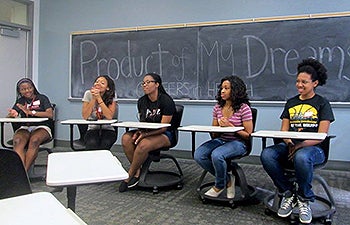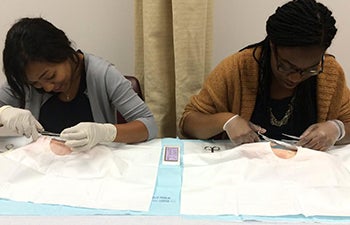Diagnosis Success
As a small child, Nnenna Ezeh pretended to perform surgery on her dolls. At age 5, she opened up a present on Christmas Day and found a real stethoscope.
“This is a tangible expression of your dreams,” her mother told her, hoping the gift would reinforce her young daughter’s passion. “Keep it to remind you of what you want to do.”
The presidential scholar is now pursuing those dreams as a major in health and humanity at USC Dornsife. Her focus is working with underserved communities.
“I was raised with the idea of service first, and I have a passion for it,” said Ezeh, whose mother Nkechy Ezeh, an associate professor at Aquinas College, established the nonprofit Early Learning Neighborhood Collaborative (ELNC). The organization provides educational resources to low-income children in Grand Rapids, Michigan, where Ezeh grew up.
While in high school, Ezeh volunteered as a childcare assistant at an inner-city community center that her mother directed prior to founding ELNC. She worked with children from newborns to age 12.
“I helped them learn how to read or with their homework after school,” said Ezeh, a senior minoring in natural sciences and healthcare studies. “It was really cool to be able to interact with students and give them one-on-one attention that they may not have been getting at home or even at school.”
Ezeh aims to become a primary care physician. “I want to have the first tangible impact on a patient and help influence their health behaviors and habits for the better,” she said.
Pursuing a career in medicine will give her an opportunity to help correct disparities within the healthcare system, she said.

From left, Janae Chatmon, Melissa Bonner, Nnenna Ezeh, Ibifuro Ogbanga and Grace Amoo participate in the Black Student Assembly’s Product of My Dreams Mentoring program, designed to expose at-risk and urban youth to the possibilities in higher education. Photo courtesy of Nnenna Ezeh.
“Being a primary care doctor will allow me to better serve people who don’t have access to quality and affordable health care,” she said. “I would like to do whatever I can to make a difference in people’s lives.”
At USC Dornsife, Ezeh has participated in Trojan Health Volunteers (THV) since her sophomore year. Administered by the Joint Educational Project at USC Dornsife, THV is a community outreach program that gives pre-health students the opportunity to gain exposure to their future occupations.
In the program, Ezeh has worked in hospitals throughout Los Angeles. “I specifically picked hospitals in downtown Los Angeles because they serve a unique population such as the homeless and the poor,” she said.
Most recently, she volunteered at California Hospital Medical Center where she worked with emergency services and in the maternity and neonatal ward.
As part of the hospital’s physician mentor program, she “shadowed” an obstetrician as she attended to her patients. One experience left Ezeh with a profound realization about the importance of the rapport between doctor and patient.
The doctor was attending to a pregnant woman who was experiencing complications. Ezeh watched as the doctor translated complicated medical terms into plain English.
“It was very interesting to see how the physician had to modify her bedside manner, and describe things a little more in-depth and a little more clearly so her patient could understand it,” Ezeh said. “But it never affected negatively upon how she interacted with the patient. There was no bias. There was no disapproval or judgment placed upon her.”
The situation reminded Ezeh to always see the humanity in whomever she will be treating.
“It served as a great reminder,” she said. “As a doctor you have the power to help a patient understand her body by explaining what’s going on in a way that she understands without devaluing her.”

Hailey Logan, a health promotion and disease prevention studies major (left), and Nnenna Ezeh during a suturing workshop led by physician assistant students at USC’s Alhambra campus. Photo courtesy of Nnenna Ezeh.
Since her sophomore year, Ezeh has served as president of the student organization African Americans in Health (AAIH) at USC. The group, which she joined the first semester of her freshman year, supports African American students in their pursuit of careers in health. AAIH works in conjunction with the USC Dornsife Office of Pre-Health Advisement to make sure students stay on track with their studies. The group also organizes professional development events such as an annual physician-alumni roundtable, where physicians of color who graduated from USC speak with undergraduates about their experiences.
Ezeh has tried to make the most of her undergraduate years. In addition to spending the summer before her senior year studying tropical diseases at the University of Oxford as part of the Problems Without Passports program, she volunteered with the nonprofit Teach for America as a teacher’s assistant in a science class at Manual Arts Senior High School near USC’s University Park campus.
She is also in her third year with the Genomic Research Experience for Undergraduates program, which supports USC students who are African American, Hispanic, Latino, Native American, or Pacific Islander as they conduct research in faculty laboratories. Ezeh has worked in three different labs studying childhood obesity, health behaviors and the effect of a high fructose diet on cardio-metabolic functions.
In addition to her pre-health studies and volunteer commitments, Ezeh has found time to be a Dornsife Ambassador. After graduating and before attending medical school, she plans to work for a year in the area of community nutrition.
“My dream job would be working and teaching nutrition in places like community clinics or schools around Los Angeles,” she said. “I’d like to make an impact in that field before I go on to medical school.”
Ezeh said AAIH has greatly helped her along the way.
“As a freshman, especially an out-of-state freshman that did not have someone in my family who was in the medical field, it was kind of hard,” she said. “I didn’t know where to go, and so I went to AAIH, and it provided me with the resources to make sure I’m on the right track. Now, I’m paying it forward.”